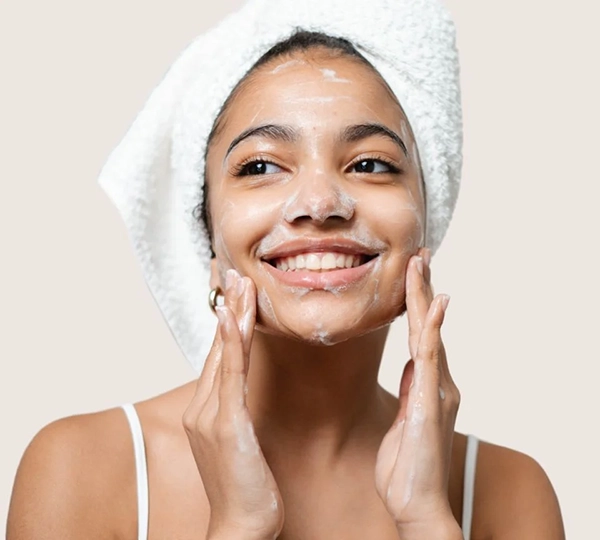If you’re reading this, chances are you’ve been battling the shiny forehead, the midday oil slick, and those pesky breakouts that come with having oily skin. Oily skin can be both a blessing and a curse. While the natural oils can keep your skin looking youthful longer, they can also lead to acne, blackheads, and a perpetual greasy feeling.. But fear not, because with the right skincare routine, you can keep your skin looking fresh, healthy, and shine-free. In this guide, we’ll dive into the ultimate skincare routine for oily skin, optimizing your routine for maximum benefits, and answering some of the most frequently asked questions about oily skin care.
Table of contents
Understanding Oily Skin
What Causes Oily Skin?
Oily skin is primarily caused by overactive sebaceous glands, which produce excess sebum. Several factors contribute to this overproduction:
- Genetics: If your parents have oily skin, chances are you will too.
- Hormones: Hormonal changes, particularly during puberty, menstruation, or stress, can trigger oil production.
- Diet: High-glycemic foods and dairy can sometimes exacerbate oily skin.
- Environment: Humid and hot weather can make your skin oilier.
- Incorrect Skincare: Using harsh products can strip your skin of its natural oils, causing it to produce even more oil in response.
The Importance of a Skincare Routine for Oily Skin
A consistent skincare routine for oily skin can help control oil production, reduce breakouts, and improve the overall appearance of your skin. It’s about finding the right balance – you don’t want to strip your skin of all its natural oils, but you also don’t want to let it become a breeding ground for acne and blackheads.
The Ultimate Skincare Routine for Oily Skin
Morning Routine
1. Cleanse
Start your day with a gentle, foaming cleanser designed for oily skin. Look for ingredients like salicylic acid or benzoyl peroxide that can help control oil and prevent breakouts. Avoid harsh cleansers that strip your skin of natural oils, as this can lead to increased oil production.
- Recommended Products:
- Neutrogena Oil-Free Acne Wash
- CeraVe Foaming Facial Cleanser
2. Tone
Toners can help remove any leftover dirt and oil while restoring your skin’s natural pH balance in your Skincare Routine for Oily Skin. Choose an alcohol-free toner with ingredients like witch hazel or tea tree oil, which are known for their astringent and anti-inflammatory properties.
- Recommended Products:
- Thayers Witch Hazel Toner
- The Body Shop Tea Tree Skin Clearing Mattifying Toner
3. Serum
Serums are packed with active ingredients that can target specific skin concerns. For oily skin, opt for a lightweight, oil-free serum containing ingredients like niacinamide or hyaluronic acid, which can help regulate oil production and keep your skin hydrated.
- Recommended Products:
- The Ordinary Niacinamide 10% + Zinc 1%
- La Roche-Posay Hyalu B5 Serum
4. Moisturize
Yes, even oily skin needs moisturizer! In your Skincare Routine for Oily Skin, look for a lightweight, non-comedogenic moisturizer that won’t clog your pores. Gel-based or water-based moisturizers are ideal for oily skin as they provide hydration without the heavy, greasy feel.
- Recommended Products:
- Neutrogena Hydro Boost Water Gel
- Clinique Dramatically Different Hydrating Jelly
5. Sunscreen
Never skip sunscreen. Oily skin still needs protection from UV rays. Opt for an oil-free, mattifying sunscreen to prevent shine and protect your skin.
- Recommended Products:
- La Roche-Posay Anthelios Clear Skin Dry Touch Sunscreen
- EltaMD UV Clear Broad-Spectrum SPF 46
Night Routine
1. Remove Makeup
If you wear makeup, it’s crucial to remove it thoroughly at the end of the day as part of your Skincare Routine for Oily Skin. Use a gentle makeup remover or micellar water to ensure all traces of makeup are gone before you cleanse.
- Recommended Products:
- Bioderma Sensibio H2O Micellar Water
- Garnier SkinActive Micellar Cleansing Water
2. Cleanse
Use the same gentle, foaming cleanser from your morning routine to wash away the day’s dirt, oil, and impurities.
3. Exfoliate (2-3 times a week)
Exfoliation helps to remove dead skin cells that can clog pores and lead to breakouts. Use a gentle exfoliant with ingredients like salicylic acid or glycolic acid. Avoid over-exfoliating, as this can irritate your skin and cause more oil production.
- Recommended Products:
- Paula’s Choice Skin Perfecting 2% BHA Liquid Exfoliant
- Mario Badescu Glycolic Foaming Cleanser
4. Tone
Follow up with your toner to ensure your skin is thoroughly clean and prepped for the next steps.
5. Treatment
At night, you can use targeted treatments like retinol or spot treatments for acne. Retinol helps to regulate oil production and promote cell turnover, while spot treatments can tackle active breakouts.
- Recommended Products:
- Differin Adapalene Gel 0.1% Acne Treatment
- Mario Badescu Drying Lotion
6. Moisturize
Finish off your routine with a lightweight moisturizer. Even though it’s nighttime, hydration is key to keeping your skin balanced.
Weekly Treatments
1. Clay Masks
Clay masks are great for oily skin as they help to draw out impurities and excess oil. Use a clay mask once or twice a week as part of your Skincare Routine for Oily Skin to keep your skin clear and matte.
- Recommended Products:
- Aztec Secret Indian Healing Clay
- Origins Clear Improvement Active Charcoal Mask
2. Hydrating Masks
Oily skin can sometimes become dehydrated, leading to increased oil production. Using a hydrating mask once a week can help keep your skin balanced.
- Recommended Products:
- Laneige Water Sleeping Mask
- Dr. Jart+ Water Replenishment Cotton Sheet Mask
Additional Tips for Managing Oily Skin
- Watch Your Diet
What you eat can impact your skin. Aim for a balanced diet rich in fruits, vegetables, and lean proteins. Avoid high-glycemic foods and reduce dairy intake if you notice it worsens your skin.
- Stay Hydrated
Drinking plenty of water helps to flush out toxins and keep your skin hydrated from within. Sometimes, dehydration can actually cause your skin to produce more oil.
- Use Blotting Papers
Blotting papers are a quick fix for absorbing excess oil without disturbing your makeup. Keep a pack in your bag for on-the-go touch-ups.
- Avoid Overwashing
While it might be tempting to wash your face multiple times a day, overwashing can strip your skin of its natural oils and cause it to produce even more oil. Stick to cleansing twice a day as part of your Skincare Routine for Oily Skin.
- Regular Facials
Treat yourself to regular facials to deeply cleanse and treat your skin. Look for facials that focus on decongesting pores and controlling oil production.
Conclusion
Managing oily skin doesn’t have to be a constant battle. With the right skincare routine and a bit of patience, you can keep your skin looking balanced, healthy, and radiant. Remember, the goal isn’t to eliminate oil completely – your skin needs some oil to stay healthy. It’s all about finding that sweet spot where your skin is hydrated but not greasy. So, embrace your natural glow and follow this skincare routine for oily skin to put your best face forward every day.
FAQs
1. What ingredients should I look for in products for oily skin?
Look for ingredients like salicylic acid, benzoyl peroxide, niacinamide, and hyaluronic acid. These ingredients help control oil, prevent breakouts, and keep your skin hydrated.
2. What is the best cleanser for oily skin?
The best cleanser for oily skin in a Skincare Routine for Oily Skin is a gentle foaming cleanser with salicylic acid or benzoyl peroxide. These ingredients help to clear out pores and reduce oil production.
3. Can I skip moisturizer if I have oily skin?
No, skipping moisturizer can make your skin produce more oil. Opt for a lightweight, non-comedogenic moisturizer to keep your skin hydrated without clogging pores.
4. How often should I exfoliate if I have oily skin?
Exfoliate 2-3 times a week using chemical exfoliants like AHAs or BHAs. These are less abrasive than physical scrubs and help to remove dead skin cells and prevent clogged pores.
5. Can oily skin be dehydrated?
Yes, oily skin can be dehydrated. When your skin lacks water, it can produce more oil to compensate. Using a lightweight, hydrating moisturizer can help balance your skin.
6. What kind of sunscreen is best for oily skin?
Choose a mattifying, oil-free sunscreen that provides broad-spectrum protection. Look for sunscreens labeled as non-comedogenic to avoid clogging pores.
7. Can my diet affect my oily skin?
Yes, a diet high in sugary foods and dairy can exacerbate oily skin. Aim for a balanced diet with plenty of fruits, vegetables, and lean proteins to help manage oil production.
By following this comprehensive skincare routine for oily skin and incorporating these tips, you’ll be well on your way to achieving a balanced and healthy complexion. Stay glowing!
Related Posts:
What’s in Your Skincare Products? Avoid These 4 Dangerous Ingredients!
What is a Best Age to Start Using Eye Cream?
Everything You Need to Know About Body Scrubs and 2 DIY Recipes

